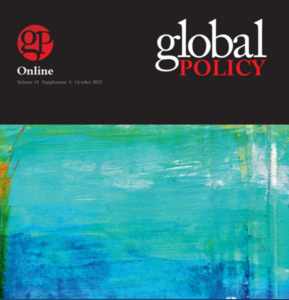 China has defied predictions of the “autocratic fallacy,” which suggests that authoritarian governments cannot ensure indefinite increases of public goods without increasing their level of democratic accountability and openness, says a new analysis.
China has defied predictions of the “autocratic fallacy,” which suggests that authoritarian governments cannot ensure indefinite increases of public goods without increasing their level of democratic accountability and openness, says a new analysis.
But new challenges to the “China model” may yet disrupt this path, according to the latest special issue of Global Policy, devoted to the latest Berggruen Governance Index. The journal analyzes the Index’s findings on three dimensions of governance: state capacity, democratic accountability, and public goods provision, alongside an updated interactive website for the Index.
“In a time of increasingly volatile uncertainty for international politics and democracy, the Berggruen Governance Index provides crucial grounding for discourse and opinion,” said Helmut Anheier, Principal Investigator and Adjunct Professor at UCLA. These statistical indicators “can help us navigate the uneasy direction of liberal democracy, a multipolar balance of power, and heightened regional conflict,” he adds.
 China’s democratic accountability is unlikely to increase in the near future, writes Hertie School analyst Yuqing Yang. However, whether China can improve public goods provision and state capacity will depend on several factors, including indigenous innovation, the development of the digital and green economy, and the introduction of a property tax to improve revenue structures of local governments.
China’s democratic accountability is unlikely to increase in the near future, writes Hertie School analyst Yuqing Yang. However, whether China can improve public goods provision and state capacity will depend on several factors, including indigenous innovation, the development of the digital and green economy, and the introduction of a property tax to improve revenue structures of local governments.
Most fundamentally, with increasing global challenges followed by the Russo-Ukrainian War and possible de-globalization, China needs to preserve the two bottom lines (di xian) it set for itself: to guarantee food security and to avoid returning to large-scale poverty, she adds.
Ukraine has alternated between authoritarian and democratic development patterns, analyst Christian Fröhlich contends. However, Russia’s invasion has contributed to uniting and consolidating Ukrainian society and politics and could considerably push the nation-building process forward.
 Key insights from the Berggruen Governance Index include:
Key insights from the Berggruen Governance Index include:
- The level of public goods provision is a function of democratic accountability and state capacity
- In the United States, relatively poor recent trends across all three dimensions reflect political turmoil and insufficient policy response to the 2008 global financial crisis
- Lackluster investment after the global financial crisis may undermine the world-leading performance of Europe’s largest economies across all three dimensions
- While India’s state capacity has improved, democratic decline and the continued dominance of informal arrangements in employment threatens its positive trajectory
- Ukraine’s volatility across the Index’s dimensions reflects a fundamental governance instability that may be changing in response to the Russian invasion
- Lagging state capacity and government debt in Ghana, Kenya, Nigeria, Senegal, and South Africa may hold these nations back from further improvements in public goods and democratic accountability
- Performance of Brazil, Venezuela, Mexico, Colombia, and Argentina reflect a new “lost decade” for quality of life in Latin America.
“Does democracy matter for people’s quality of life? Will autocracies be able to sustain effective governance over time? The Global Policy special issue and our new Index site are great assets to those working to formulate answers to these questions,” said Dawn Nakagawa, the Berggruen Institute’s Executive Vice President. RTWT







